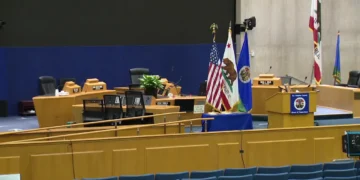Los Angeles County’s Measure G proposal aims to reshape governance, but Supervisor Kathryn Barger raises concerns over process and potential impacts.
With less than a week until Election Day, Los Angeles County residents will soon decide on Measure G, a controversial proposal that would fundamentally alter county governance. The measure would expand the Board of Supervisors from five to nine members, make the county CEO an elected position, and introduce various reforms intended to enhance government transparency and accountability.
In a recent interview, Supervisor Lindsey Horvath advocated for Measure G, calling it a path to “desperately needed checks and balances” that would bring county government “closer to the people”—all without raising taxes.
However, Supervisor Kathryn Barger voiced sharp criticism of Measure G in a separate interview, expressing disappointment over how the proposal was introduced and asserting that the process lacked transparency. “This is a measure that’s supposed to be about transparency and actually accountability, and it was done in secret with no transparency, but more importantly with no input by stakeholders or even the public,” Barger said.
Barger claims that the measure was drafted behind closed doors, mainly by Supervisors Holly Mitchell and another unnamed board member, without consulting her. She expressed particular concern about the plan for an elected county CEO, fearing it could lead to political priorities that favor wealthier regions at the expense of smaller communities like Antelope Valley.
“I truly do believe that this elected CEO is going to politicize the county in a way that no one’s ever seen, and it’s going to actually marginalize disenfranchised communities, especially unincorporated areas,” she warned.
Barger also highlighted potential financial issues, saying the cost estimates for Measure G’s implementation have grown significantly since its introduction. “The estimate right now is it’s $8 million in one-time startup funds to pass Measure G and implement it,” Barger said. “We just found out the ethics commission is going to cost about $21 million, and that’s ongoing … And that’s not including the CEO and the staff needed for this elected CEO who, oh, by the way, has full veto power, no term limits.”


























